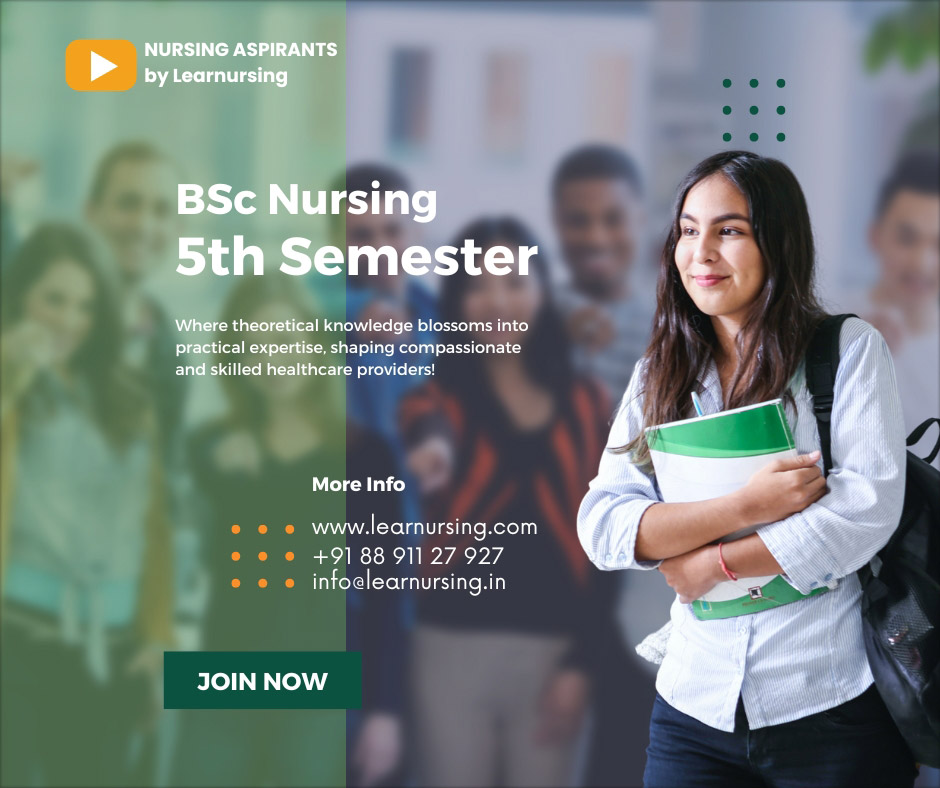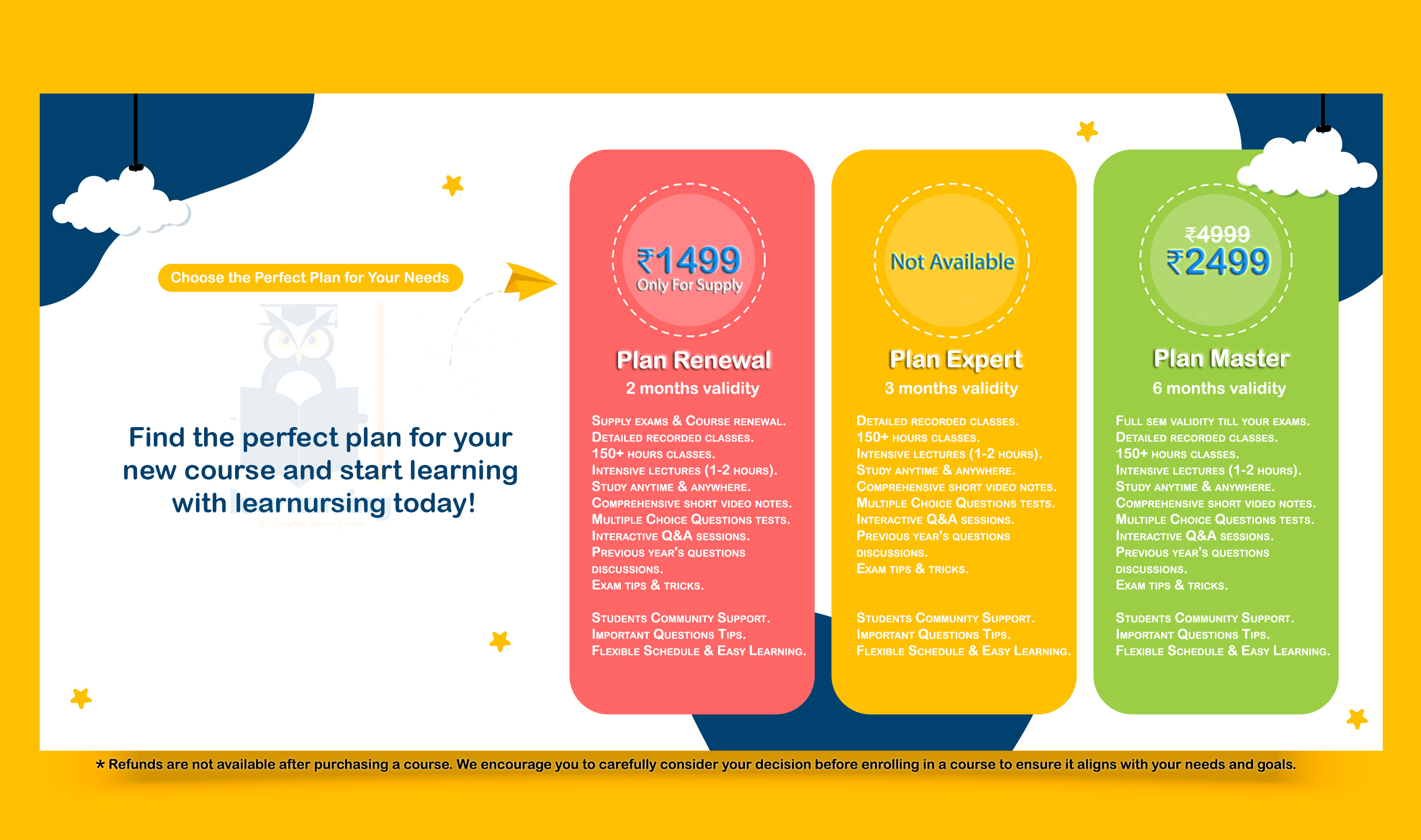Course Details
- Course Name: BSc Nursing
- Course Type: Paid
- Course Duration: 6 Month(s)
- Mode of Class: Online Only
Course Features
- Enrolled: + Students
- Subjects: Nos
- Videos: nos
- Faculty: Nursing Aspirants
Dear Nursing Students,
Prepare to advance your nursing education with our comprehensive and focused crash course tailored for the fifth semester of BSc Nursing. This course is meticulously designed to cover key subjects, ensuring that you gain the essential knowledge and skills needed to excel in your exams and clinical practice.
Course Overview:
Our fifth-semester online tuition includes the following subjects:
-
Child Health Nursing I:
Dive into the specialized care of infants, children, and adolescents. This course covers growth and development, common pediatric illnesses, and the nursing interventions necessary to promote the health and well-being of young patients. You will learn how to provide family-centered care that addresses both the physical and emotional needs of children. -
Mental Health Nursing I:
Gain an understanding of the principles of psychiatric nursing, focusing on the care of individuals with mental health disorders. This subject emphasizes therapeutic communication, mental health assessment, and evidence-based interventions. You will also explore the legal and ethical aspects of mental health nursing. -
Community Health Nursing I (including Environmental Science & Epidemiology):
Explore the role of nursing in promoting community health and preventing illness. This course integrates environmental science and epidemiology, equipping you with the knowledge to assess and address public health issues. You’ll learn to work with individuals, families, and communities to improve overall health and quality of life. -
Educational Technology/Nursing Education:
Discover the principles of teaching and learning within the field of nursing. This course covers instructional methods, curriculum development, and the use of technology in education. You will learn to design and deliver effective educational programs for nursing students, healthcare professionals, and patients. -
Introduction to Forensic Nursing and Indian Laws:
Delve into the emerging field of forensic nursing, which intersects healthcare and the legal system. This subject covers the role of nurses in forensic settings, the collection and preservation of evidence, and the legal responsibilities of healthcare providers in India. You will gain insight into Indian laws related to healthcare and patient rights.
Course Features:
- Comprehensive Coverage: Each subject is covered in detail, focusing on the most critical topics.
- Flexible Learning: The course is available in both Malayalam and English to accommodate diverse learning preferences.
- Intensive Schedule: Classes are held four times a week, allowing you to complete the course within a structured and focused timeframe.
Why Choose Our Crash Course?
- Exam-Ready Preparation: This course is designed to ensure you are fully prepared to excel in your exams with a clear understanding of concepts.
- Focused Learning: With a curriculum tailored to the fifth-semester syllabus, you’ll receive targeted preparation that maximizes your potential.
- Expert Guidance: Learn from experienced instructors who are dedicated to helping you succeed in both academic and clinical settings.
Don’t miss this opportunity to strengthen your knowledge and skills in key areas of nursing. Enroll now and take a significant step toward your nursing career goals with confidence and competence!
Semester 5
1. Child Health Nursing I
Course Description: Child Health Nursing I focuses on the nursing care of infants, children, and adolescents. The course covers the growth and development of children, pediatric illnesses, and the nursing interventions required to support health and well-being. Students will learn to provide family-centered care, addressing the physical, emotional, and developmental needs of children in various healthcare settings.
Learning Outcomes:
- Understand the normal growth and development patterns of children from infancy through adolescence.
- Recognize common pediatric illnesses and conditions and their impact on child health.
- Apply the nursing process to assess, plan, implement, and evaluate care for children.
- Provide family-centered care, supporting both the child and the family during healthcare interventions.
Course Components:
- Growth and Development: Study of developmental milestones, nutritional needs, and preventive healthcare.
- Pediatric Nursing: Nursing care for children with acute and chronic illnesses, including respiratory, gastrointestinal, and neurological conditions.
- Family-Centered Care: Strategies for involving families in the care process and addressing their needs.
- Immunization and Health Promotion: Importance of vaccination and health education for children and families.
- Practical Sessions: Clinical skills in pediatric nursing, including growth monitoring, medication administration, and patient education.
2. Mental Health Nursing I
Course Description: Mental Health Nursing I introduces students to the principles and practices of psychiatric nursing. The course focuses on the care of individuals with mental health disorders, emphasizing therapeutic communication, mental health assessment, and evidence-based interventions. Students will gain an understanding of the legal and ethical aspects of mental health nursing and the role of the nurse in promoting mental well-being.
Learning Outcomes:
- Understand the basic concepts of mental health and mental illness.
- Perform comprehensive mental health assessments and develop individualized care plans.
- Apply therapeutic communication techniques in the care of patients with mental health disorders.
- Recognize the legal and ethical considerations in mental health nursing practice.
Course Components:
- Introduction to Mental Health: Concepts of mental health, mental illness, and the continuum of care.
- Psychiatric Nursing: Care of patients with mood disorders, anxiety disorders, schizophrenia, and other mental health conditions.
- Therapeutic Communication: Techniques for building rapport, active listening, and supporting patients in crisis.
- Legal and Ethical Issues: Understanding of patient rights, confidentiality, and the Mental Health Act.
- Practical Sessions: Role-playing, case studies, and clinical experiences in psychiatric settings.
3. Community Health Nursing I (including Environmental Science & Epidemiology)
Course Description: Community Health Nursing I focuses on the promotion of health and prevention of illness at the community level. The course integrates environmental science and epidemiology, providing students with the knowledge and skills to assess and address public health issues. Students will learn to work with individuals, families, and communities to promote health, prevent disease, and improve quality of life.
Learning Outcomes:
- Understand the principles of community health nursing and public health.
- Assess community health needs and develop interventions to address them.
- Apply concepts of environmental science and epidemiology to identify and manage health risks in the community.
- Promote health and prevent disease through community-based programs and education.
Course Components:
- Community Health Nursing: Roles and responsibilities of nurses in community health settings.
- Environmental Health: Impact of environmental factors on health, including air, water, and soil quality.
- Epidemiology: Study of disease patterns, risk factors, and public health interventions.
- Health Promotion: Strategies for health education, vaccination programs, and disease prevention.
- Practical Sessions: Community assessments, health surveys, and participation in public health campaigns.
4. Educational Technology/Nursing Education
Course Description: Educational Technology/Nursing Education introduces students to the principles of teaching and learning in nursing. The course covers instructional methods, curriculum development, and the use of technology in education. Students will learn to design and deliver educational programs for nursing students, healthcare professionals, and patients, using innovative teaching strategies.
Learning Outcomes:
- Understand the principles of adult learning and educational theory.
- Develop and implement effective teaching strategies for diverse learners.
- Utilize educational technology to enhance learning experiences in nursing education.
- Evaluate the effectiveness of educational programs and make improvements.
Course Components:
- Teaching and Learning: Concepts of adult learning, teaching methods, and instructional design.
- Curriculum Development: Principles of curriculum planning, assessment, and evaluation.
- Educational Technology: Use of multimedia, simulation, and online platforms in nursing education.
- Patient Education: Strategies for educating patients and families about health and wellness.
- Practical Sessions: Development of lesson plans, teaching presentations, and the use of simulation in nursing education.
5. Introduction to Forensic Nursing and Indian Laws
Course Description: Introduction to Forensic Nursing and Indian Laws provides an overview of forensic nursing practice and the legal aspects of healthcare in India. The course covers the role of nurses in forensic settings, the collection and preservation of evidence, and the legal responsibilities of healthcare providers. Students will learn about the Indian legal system, patient rights, and the ethical considerations in forensic nursing.
Learning Outcomes:
- Understand the role of forensic nurses in the healthcare and legal systems.
- Recognize the legal and ethical responsibilities of nurses in forensic settings.
- Apply forensic nursing principles in the care of victims of violence, abuse, and trauma.
- Understand Indian laws related to healthcare, patient rights, and the responsibilities of healthcare providers.
Course Components:
- Forensic Nursing: Roles, responsibilities, and skills required in forensic nursing practice.
- Evidence Collection: Techniques for collecting, preserving, and documenting evidence in healthcare settings.
- Indian Laws: Overview of the Indian legal system, patient rights, and healthcare regulations.
- Ethical Considerations: Understanding of ethical dilemmas and decision-making in forensic nursing.
- Practical Sessions: Simulations of forensic assessments, evidence collection, and legal documentation.




